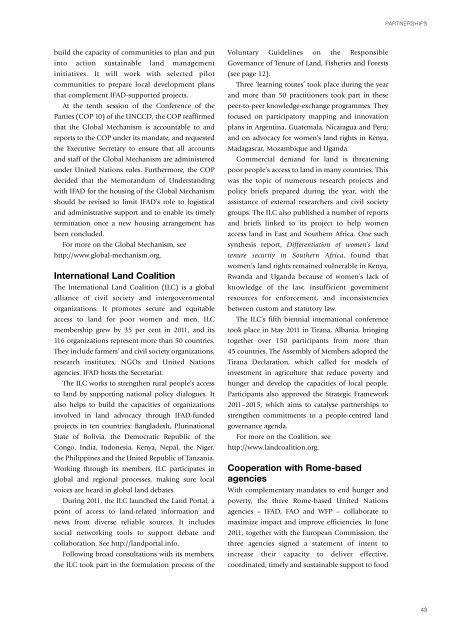ANNUAL REPORT 2011 - IFAD
ANNUAL REPORT 2011 - IFAD
ANNUAL REPORT 2011 - IFAD
Create successful ePaper yourself
Turn your PDF publications into a flip-book with our unique Google optimized e-Paper software.
uild the capacity of communities to plan and put<br />
into action sustainable land management<br />
initiatives. It will work with selected pilot<br />
communities to prepare local development plans<br />
that complement <strong>IFAD</strong>-supported projects.<br />
At the tenth session of the Conference of the<br />
Parties (COP 10) of the UNCCD, the COP reaffirmed<br />
that the Global Mechanism is accountable to and<br />
reports to the COP under its mandate, and requested<br />
the Executive Secretary to ensure that all accounts<br />
and staff of the Global Mechanism are administered<br />
under United Nations rules. Furthermore, the COP<br />
decided that the Memorandum of Understanding<br />
with <strong>IFAD</strong> for the housing of the Global Mechanism<br />
should be revised to limit <strong>IFAD</strong>’s role to logistical<br />
and administrative support and to enable its timely<br />
termination once a new housing arrangement has<br />
been concluded.<br />
For more on the Global Mechanism, see<br />
http://www.global-mechanism.org.<br />
International Land Coalition<br />
The International Land Coalition (ILC) is a global<br />
alliance of civil society and intergovernmental<br />
organizations. It promotes secure and equitable<br />
access to land for poor women and men. ILC<br />
membership grew by 35 per cent in <strong>2011</strong>, and its<br />
116 organizations represent more than 50 countries.<br />
They include farmers’ and civil society organizations,<br />
research institutes, NGOs and United Nations<br />
agencies. <strong>IFAD</strong> hosts the Secretariat.<br />
The ILC works to strengthen rural people’s access<br />
to land by supporting national policy dialogues. It<br />
also helps to build the capacities of organizations<br />
involved in land advocacy through <strong>IFAD</strong>-funded<br />
projects in ten countries: Bangladesh, Plurinational<br />
State of Bolivia, the Democratic Republic of the<br />
Congo, India, Indonesia, Kenya, Nepal, the Niger,<br />
the Philippines and the United Republic of Tanzania.<br />
Working through its members, ILC participates in<br />
global and regional processes, making sure local<br />
voices are heard in global land debates.<br />
During <strong>2011</strong>, the ILC launched the Land Portal, a<br />
point of access to land-related information and<br />
news from diverse reliable sources. It includes<br />
social networking tools to support debate and<br />
collaboration. See http://landportal.info.<br />
Following broad consultations with its members,<br />
the ILC took part in the formulation process of the<br />
Voluntary Guidelines on the Responsible<br />
Governance of Tenure of Land, Fisheries and Forests<br />
(see page 12).<br />
Three ‘learning routes’ took place during the year<br />
and more than 50 practitioners took part in these<br />
peer-to-peer knowledge-exchange programmes. They<br />
focused on participatory mapping and innovation<br />
plans in Argentina, Guatemala, Nicaragua and Peru;<br />
and on advocacy for women’s land rights in Kenya,<br />
Madagascar, Mozambique and Uganda.<br />
Commercial demand for land is threatening<br />
poor people’s access to land in many countries. This<br />
was the topic of numerous research projects and<br />
policy briefs prepared during the year, with the<br />
assistance of external researchers and civil society<br />
groups. The ILC also published a number of reports<br />
and briefs linked to its project to help women<br />
access land in East and Southern Africa. One such<br />
synthesis report, Differentiation of women’s land<br />
tenure security in Southern Africa, found that<br />
women’s land rights remained vulnerable in Kenya,<br />
Rwanda and Uganda because of women’s lack of<br />
knowledge of the law, insufficient government<br />
resources for enforcement, and inconsistencies<br />
between custom and statutory law.<br />
The ILC’s fifth biennial international conference<br />
took place in May <strong>2011</strong> in Tirana, Albania, bringing<br />
together over 150 participants from more than<br />
45 countries. The Assembly of Members adopted the<br />
Tirana Declaration, which called for models of<br />
investment in agriculture that reduce poverty and<br />
hunger and develop the capacities of local people.<br />
Participants also approved the Strategic Framework<br />
<strong>2011</strong>–2015, which aims to catalyse partnerships to<br />
strengthen commitments to a people-centred land<br />
governance agenda.<br />
For more on the Coalition, see<br />
http://www.landcoalition.org.<br />
Cooperation with Rome-based<br />
agencies<br />
With complementary mandates to end hunger and<br />
poverty, the three Rome-based United Nations<br />
agencies – <strong>IFAD</strong>, FAO and WFP – collaborate to<br />
maximize impact and improve efficiencies. In June<br />
<strong>2011</strong>, together with the European Commission, the<br />
three agencies signed a statement of intent to<br />
increase their capacity to deliver effective,<br />
coordinated, timely and sustainable support to food<br />
PARTNERSHIPS<br />
43

















